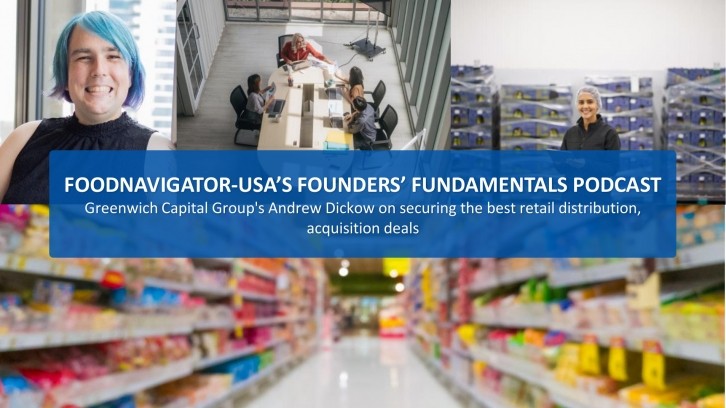[Podcast] Founders' Fundamentals: Greenwich Capital Group on negotiating everything from slotting fees to successful exits

[Editor's note: The Founders' Fundamentals podcast is FoodNavigator-USA's new monthly podcast series, dedicated to the art of building and growing CPG food and beverage brands. To view previous episodes, click here.]
Startup tip: Say ‘no to slotting fees and free fills’
Many CPG startups seeking retail distribution will often have to pay slotting or free fills — a free case of product per SKU — in exchange for retail shelf space. Startups can reduce the cost of these free fills by creating cases that contain fewer products, as brokerage firm C.A. Fortune shared in the second episode of the Founders’ Fundamentals podcast.
Additionally, slotting fees and free fills can often be negotiated, and many retailers “are more fungible with early-stage companies, ... allowing them not to have slotting fees versus well-established companies,” he added.
“One of the smartest things early-stage companies can do — especially with retailers — is saying no to slotting fees and free fills. So, at an early stage, these retailers will ask you to do that, and you are just simply not in a position to do that early in your life cycle. Down the road when you have a stronger balance sheet or the company is a little healthier, you can. That is one of the best things to do is just avoid those types of relationships,” he emphasized.
Startups also should leverage how much the retailer wants their product into negotiating any deal, Dickow noted.
“What the negotiation comes down to is: How bad do they want your product on their shelf? So, if you have a compelling new product, or you are entering a new category — or you are disrupting it — ... and people are coming into the stores and asking for your product, and it is not on the shelf, you are in a really good spot,” he added.
Ensuring startups do not become 'like the companies that they were disrupting'
In scaling their business, many startups find it hard to maintain their scrappy innovator status as they try to find new areas to grow, Dickow explained. Startups that hit $25 million in sales typically hit a hurdle when it comes to growing their brand, as the company cannot innovate as quickly as an early-stage brand, he noted.
“Whether it be in flavor, format, packaging [and] branding, there is no bureaucracy. There is shorter timelines, there is more innovation [and] there is more disruption. ... As these companies scale, they just become more like the companies that they were disrupting,” he said.
To maintain that innovative startup mentality, the brand needs to establish “strong values and a core mission that are not just put on a bulletin board on the wall,” Dickow said. Leadership should also exemplify that sense of culture and mission, even when they are reaching new retail and sales milestones, he added.
“How do you artificially manufacture this chip on your shoulder that you had when you started and keep it? As [startups] grow, they need to be cognizant of what got the company to where they are in the first place and put the processes in place to maintain that from an operational, strategic and probably the most important a cultural perspective,” he said.
Planning an exit? Have financial, co-manufacturing, process documents ready
When a brand reaches a certain scale and profitability, founders might start to consider selling their brand. However, many startups face challenges in selling their business because their legal house is not in order, Dickow said.
Startups need clear documentation on all their business relationships — including co-manufacturing agreements and distributor deals — and ensure that their intellectual property is properly protected, Dickow noted.
“Every business owner I have ever met [says,] ‘You are not going to have to worry about me — our financials are clean.’ ... What does that actually mean? A sophisticated investor is going to want audited financials. They are going to come in and do a quality of earnings, they are going to hire Price Waterhouse Coopers to vet it out, and it is going to need to be gap-compliant. And so, 99% of these companies that are early stage do not fit the bill,” he said.



![[Podcast] Founders’ Fundamentals: C.A. Fortune shares tips for selecting the perfect broker](/var/wrbm_gb_food_pharma/storage/images/_aliases/wrbm_medium/publications/food-beverage-nutrition/foodnavigator-usa.com/article/2024/07/10/podcast-founders-fundamentals-c.a.-fortune-shares-tips-for-selecting-the-perfect-broker/17570197-2-eng-GB/Podcast-Founders-Fundamentals-C.A.-Fortune-shares-tips-for-selecting-the-perfect-broker.jpg)







